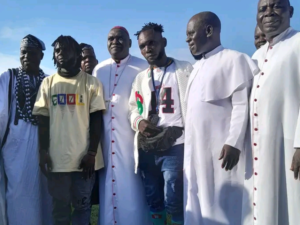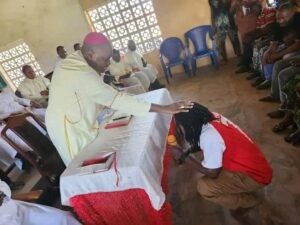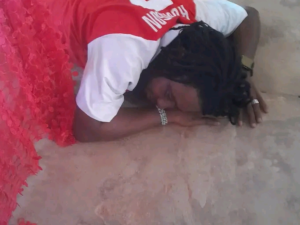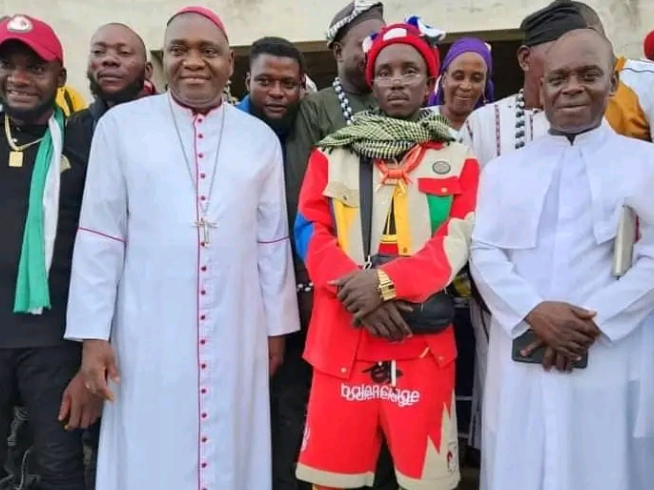Armed only with scripture and faith, two Catholic priests are coaxing Benue’s most-feared militants out of hiding and steering a war-torn community towards peace.
By Manasseh Mbachii
“A group of militants is ready to surrender. Go and bring them home,” Reverend Father Michael Mchia heard over the phone.
The time was 10:45pm on September 17, 2024. The instructor was his superior, Bishop Isaac Dugu.
Just moments earlier, his fingers had traced his favourite scripture in the Bible, Matthew 5:9, as candlelight flickered over his chapel’s tabernacle: “Blessed are the peacemakers, for they shall be called children of God.”
He had clung to this verse in hope for peace through years of bloodshed and heartbreak in Sankera, a district in Nigeria’s Benue State—a once-thriving agricultural belt now scarred by militia violence, herdsmen invasions, and military raids that had turned communities into ghost towns.
Amid Sankera’s ruin—from scorched fields to silent homes—Father Mchia and Bishop Dugu have emerged as unconventional peacemakers.
Armed not with force, but with faith and persuasion, they are coaxing hardened militants out of hiding and into reconciliation, hoping that if successful, their efforts could reverse years of terror and rebuild a shattered region surrendered to rifles.
Before that call, Father Mchia had walked into rebel camps, pleaded with warlords, and brokered uneasy truces. He had stood unarmed before young men with rifles, asking them to consider their mothers, their children, and their future and permanently give up violence.

Now, as he sets out to meet the surrendered militia in Yooyo ward, where farmlands had turned to graveyards and homes had been reduced to ash, he knew that call from Bishop Dugu was the long-awaited “whisper of hope.”
At Yooyo, under the shade of a mango tree, young men with hardened faces stood. Their leader, Ushahemba Terzungwe, known as Lighter, spoke first.
“We are tired,” he said, clad in rough jeans and a tattered shirt, his unkempt hair and nails revealing deepness in jungle life. “We want to rest, and our people are tired, too.”
The priests’ mission in a fragile land
The conflict in Sankera started in 2015 when a militia group led by one Terwase Akwaza, also called Gana, clashed with rival armed groups and security forces. From then on, he terrorised local communities through extortion, abductions, and deadly attacks.
That year, the Benue State government under former Governor Samuel Ortom launched an amnesty programme.
Gana and his over 600 lieutenants surrendered. But peace was short-lived after Denen Igbana, an aide to the governor, was assassinated in 2016. The government accused Gana and his group of being responsible, ending the pact.
For four years, Gana went underground as the military raided his strongholds with little success, partly due to the conspiracy of silence among locals who terribly feared Gana.
In 2020, Gana decided to surrender, only to be intercepted and killed extrajudicially by the Nigerian military while on his way to Makurdi, the Benue State capital. His death shattered trust. His lieutenants—Konyo, Chen, Fullfire, John Gata, and Anyongo—vowed revenge.
They unleashed brutal attacks, killing over 1,000 as they invaded villages between 2023 and 2024, according to local sources. The district’s conflict situation was worsened by repeated herdsmen invasions of farming communities.
As Sankera descended into violence, Father Mchia and Bishop Dugu stepped forward in 2023—armed not with guns, but with faith—to chart a new path toward peace.
They launched a grassroots peace initiative in 2023 aimed at fostering reconciliation and local trust. Their approach was spiritual and unconventional—reaching the heart before the law.
“After praying, I discovered this is a battle we must fight spiritually first,” Father Mchia said. “What drives me is the desire to see displaced people return to their homes.”
Since then, a quiet but powerful movement has reshaped the region. Through dialogue and spiritual guidance, the priests persuaded some of Sankera’s most feared armed men to lay down their weapons and embrace peace.
The eventual surrender of Gana’s men and members of rival groups signalled a hoped-for end to the deadly era of militia violence.

One by one, the militants knelt before Father Mchia, not asking for negotiations, but forgiveness. As rival groups also laid down arms, a stolen vehicle was returned. Peace was no longer a concept; it was action.
For four days after their surrender, Tacha buzzed with celebratory activities. Women erupted in celebration. Men clapped. Children danced. The air vibrated with drumming and prayer. But beyond the music, the real work had begun.
“Like the prodigal son, you have returned home,” Father Mchia told them. “But returning is not enough. You must rebuild what you destroyed.”
Ready for peace
On October 23, 2024, at St Mary’s Church in Chito, Ukum Local Government Area, another key meeting took place.
The priests arrived, and so did Fullfire, another militant leader—a Gana lieutenant known off the battlefield as Terhemen Mzaga. Lying face down at the bishop’s feet, he declared, “We are prepared for peace.”

His wife stood nearby, eyes fixed on the ground. Her presence signalled something deeper: that peace was becoming personal, not just political.
Then came Chen, a militia leader in Ukum Local Government Area, long feared and spoken of in whispers. At St Stephen’s Parish in Gbagir, on October 26, he addressed the crowd:
“The world is an examination given to us by God. No one should copy from another.” As he continued in parables and verses, Bishop Dugu teased, “Chen, you speak like a pastor.”
“He mentioned God 63 times, the Church six times, and the Bible twice,” Father Mchia recalled.
The most feared of them all, Konyo, a militia leader, emerged at St John the Evangelist Church in Kasar in the Katsina-Ala local government. Unrecognisable at first, his mother stepped forward and identified him: “This is my son.”
“We have been longing for peace,” Konyo said. “Now that communication is established, we will collaborate with the Church. Every captive will be released, and stolen property will be returned.”
For small business owners in the area, it is recovery time.
“I used to pay taxes to those with guns. Now that relative peace has returned, they have stopped calling,” said Atindi Tor, a businessman who sells phones in Logo LGA.
As peace shapes up, Father Mchia reflects on the actions of the government and the military toward Gana and calls it a grave mistake that should never be repeated to avoid escalating violence.
“He had surrendered in good faith. Instead of restoration, he met death. That broke the trust of many,” he said. “Those who ordered Gana’s killing thought it would solve the crisis. It only worsened it.”
The Catholic priests’ success has come with many challenges, including threats to life. Still, they have remained resolute.
“The Rosary is mightier than the AK-47. I have seen bullets fail, but prayer never fails,” Father Mchia said. “This fight is not mine—it is God’s, and He will finish what He has started.”
As Sankera walks the road to peace, the priests lead not with power but with prayer, patience, and purpose—restoring hope to Nigeria’s troubled food basket.
In war-torn Benue State, Nigeria, two Catholic priests, Father Michael Mchia and Bishop Isaac Dugu, are leading an unconventional peace initiative. Instead of force, they use faith and negotiation to guide militants out of violence. The conflict began in 2015 with a militia led by Terwase Akwaza, aka Gana, whose criminal activities and subsequent assassination by the military fueled years of violence. This escalated with rival militia and herdsmen invasions, leaving the region devastated.
Despite previous failures in peace efforts, the priests initiated a grassroots movement in 2023, focusing on spiritual reconciliation and dialogue. Their efforts have seen significant results, as former militants seek forgiveness and choose peace over continued violence. Key figures like Konyo and Fullfire have laid down arms, emphasizing collaboration with the Church for community rebuilding. The return of properties and cessation of illegal tax collection mark the beginning of recovery for local businesses, fostering trust and hope in the community.
The priests' mission underscores the need for a non-violent approach to peacebuilding, criticizing past government and military actions that aggravated conflicts. Their efforts reflect the power of prayer and faith in conflict resolution, offering a transformative vision for Sankera and beyond.






